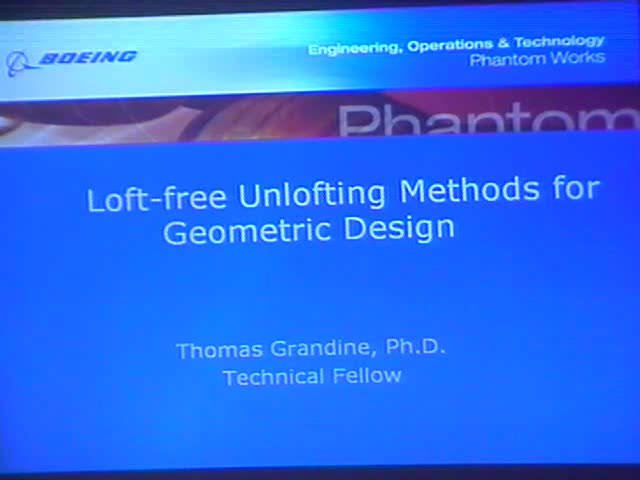Team 4: Loft-free unlofting methods for geometric design
Presenter
August 6, 2008
Keywords:
- geometric
MSC:
- 78A05
Abstract
Project Description: The process of laying out the curves and surfaces
needed to describe free form shapes in mechanical design is called
lofting. Examples of lofting include shapes such as ship hulls,
airplane wings and bodies, automobile exteriors, and so on. The best
lofting procedures take a vector of inputs, which can contain items like
wing span, wing sweep angle, aspect ratios, wing leading edge
curvatures, etc., and produce a mathematical model of the geometric
shape. Good lofting procedures necessarily have to process the input
data nonlinearly in order to produce acceptable shapes.
Additionally, it is frequently important to solve the inverse problem.
Specifically, one is given a mathematical model of a geometric shape
and, with any luck, a lofting code and wants to know what vector of
inputs to the lofting code will produce the given shape. This problem
has been called the unlofting problem, and it can usually be solved with
with standard techniques in non-linear least squares and non-linear
parameter estimation. Just as frequently, though, the unlofting problem
arises in contexts where no lofting code exists, requiring such a code
to be produced as part of the solution. So far, the requirement to
produce a lofting code as part of the solution to the unlofting problem
has ruined all attempts to produce a fully automatic solution.
This project will attempt to construct a prototype unlofting code given
only a final geometric shape with no accompanying lofting code. Some
recent developments in multiresolution modeling have suggested a
promising approach to this problem that we will explore during the
workshop, focusing initially on 2D curves and then migrating to simple
3D shapes if time permits.
References:
"Multiresolution morphing for planar curves," by S. Hahmann, G.-P.
Bonneau, M. Cornillac, and B. Caramiaux.
Computing 79 (2-4), pp. 197-209 (2007)
Prerequisites:
Required: 1 semester of numerical analysis and computing skills.
Desired: Knowledge of non-linear least squares, splines, and Python
programming.
Keywords:
Lofting, geometric morphing, inverse problems, multiresolution modeling,
nonlinear parameter estimation.
